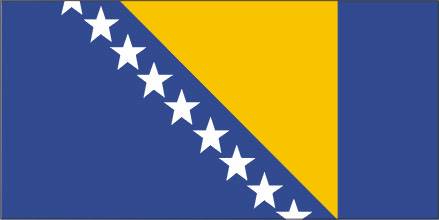Bosnia and Herzegovina, often simply referred to as Bosnia, is a country located in Southeastern Europe on the Balkan Peninsula. It shares borders with Croatia to the north, west, and southwest, Serbia to the east, and Montenegro to the southeast. The country has a complex history shaped by its diverse ethnic and religious composition, as well as its position at the crossroads of different civilizations.
Here are some key facts and information about Bosnia and Herzegovina:
Geography and Landscape: Bosnia and Herzegovina is characterized by a diverse geography that includes mountains, valleys, rivers, and lakes. The Dinaric Alps run through the country, offering beautiful landscapes and outdoor recreational opportunities.
Ethnic Diversity: The population of Bosnia and Herzegovina is ethnically diverse, with three main ethnic groups: Bosniaks (Bosnian Muslims), Croats, and Serbs. This diversity has played a significant role in the country's history and conflicts.
History: Bosnia and Herzegovina has a complex history, including periods of Ottoman rule and Austro-Hungarian administration. It was part of Yugoslavia until the early 1990s when it gained independence, leading to the Bosnian War (1992-1995), which resulted in significant ethnic and territorial changes.
Religious Composition: The country has a mix of religions, with Islam, Christianity (both Catholicism and Orthodox Christianity), and smaller religious communities. Religious diversity has also been a factor in the country's history and identity.
Sarajevo: The capital and largest city of Bosnia and Herzegovina is Sarajevo. It is known for its cultural heritage, including Ottoman and Austro-Hungarian architecture, and its significance as the location of the assassination of Archduke Franz Ferdinand in 1914, which triggered World War I.
Dayton Agreement: The Dayton Agreement, signed in 1995, brought an end to the Bosnian War and established the current political structure of the country, which consists of two entities: the Federation of Bosnia and Herzegovina and the Republika Srpska.
Economy: Bosnia and Herzegovina's economy has been recovering since the end of the war, but it still faces challenges such as high unemployment and political issues that can impact economic development.
Tourism: The country offers a range of attractions for tourists, including its historical and cultural sites, natural beauty, and outdoor activities. Cities like Mostar, known for its iconic Stari Most (Old Bridge), and natural landmarks like Plitvice Lakes National Park, are popular destinations.
Languages: The official languages of Bosnia and Herzegovina are Bosnian, Croatian, and Serbian. These languages are closely related and mutually intelligible.
European Integration: Bosnia and Herzegovina has expressed interest in joining the European Union (EU), but the process has been complicated by political and ethnic divisions within the country.

